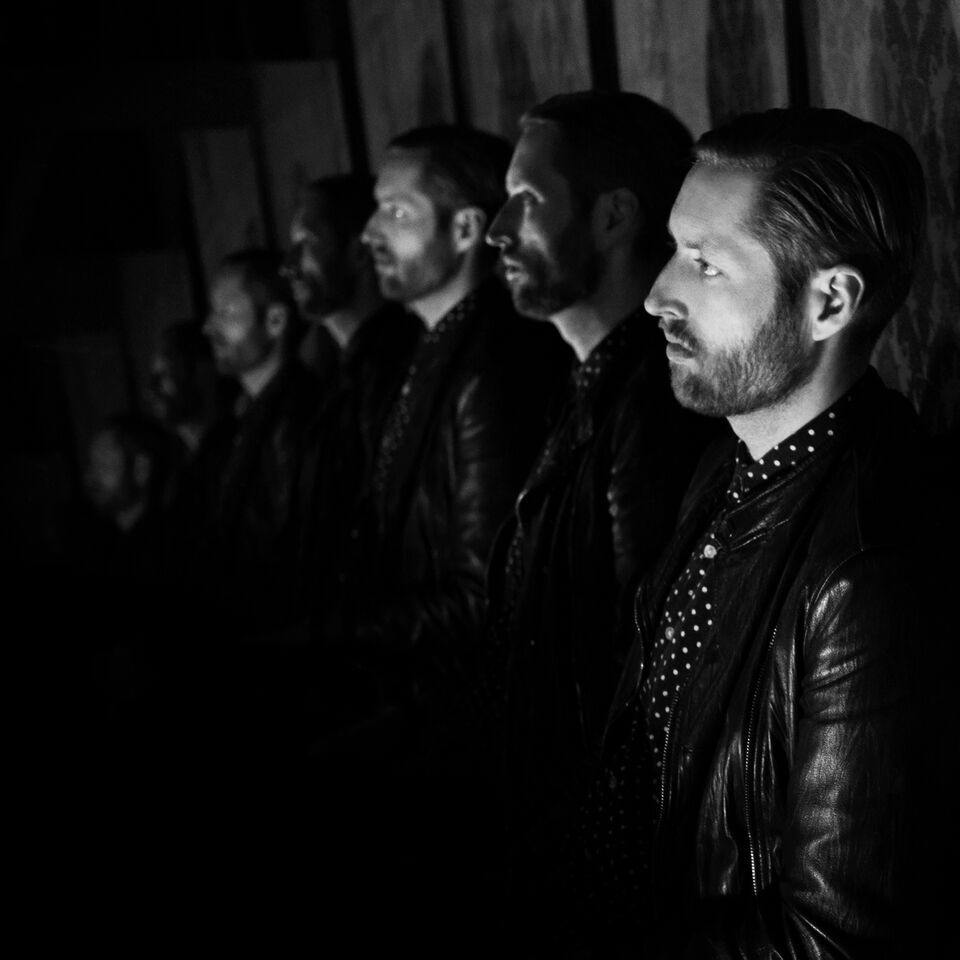Mark Stoermer’s Spell

Mark Stoermer is more than just the bass line in “Mr. Brightside.” While his musical career began over a decade ago with the Killers’ debut Hot Fuss—and he remains the band’s bassist—Stoermer has since released two solo records through his own label, St. August Records. First was Another Life in 2011, and in August of this year, its follow-up came in the form of Dark Arts, a daring and experimental record with psychedelic influences that subsumes listeners into a world far removed from physical reality. Dark Arts is a multi-faceted yet comprehensive experience that proves Stoermer’s ability to captain the whole ship (one entirely his own), rather than offer just one pair of hands on deck.
His new music video for “Take My Time” —a Dark Arts track with the potential to hex listeners into a softened hypnotic state—premieres exclusively below. Last week, we caught up with Stoermer over the phone to discuss the video’s literary roots, his nostalgia for the days of the full album experience, and his major musical influences.
CHRISTINA CAMBRIA: Can you tell us a little bit about the creative choices that went into making the video for “Take My Time?”
MARK STOERMER: Well, the video is just taking stock footage from a Don Quixote film done by Orson Welles that was never completed. There’s a whole story about it; there’s a documentary about the attempts to make a Don Quixote film. Terry Gilliam attempted to make one and there’s supposed to be the curse of La Mancha and all that… Other directors have attempted to make a film adaptation of that book and it never happened. But the reason I chose it was because that’s one of my favorite books of all time and it’s very influential to me. The song has a nod to it in the lyrics. I wouldn’t say the lyrics are completely inspired by Don Quixote but I say, “Take Rocinante for a ride,” which is the horse in the novel.
CAMBRIA: Was Don Quixote influential for the album as a whole or just for “Take My Time?”
STOERMER: I don’t know about as a whole, but two songs in total definitely have a lyrical reference. “Pretend Song,” the last song on the album, is highly inspired by Don Quixote, even more so than “Take My Time.” [In “Pretend Song,”] I had that idea of imagination and kind of living in a fantasy world in mind from the book. But “Take My Time” is a little more loosely inspired by it. Like I said, it’s just one lyric. It’s more of a feeling.
CAMBRIA: The album’s opening track, “Alchemical Formula,” is a unique introduction to Dark Arts. Why did you decide to start it in this way?
STOERMER: My original intention was to make that the introduction to a different song that isn’t on the record, one that I may put out on a bonus EP or a bonus version of the album. That bonus song is actually a long, almost prog rock, instrumental jam. But when we completed that introduction [in “Alchemical Formula”], it just felt like, “This sounds like the beginning of an album.” My friend and the album’s co-producer, David Hopkins [of Bombay Heavy], called a friend of his, Tony Curtis, who’s this older British gentleman who lives in Las Vegas, and we asked him to read the speech that I wrote for the track. I wrote those words. And it made sense because we were kicking around the idea of “the dark arts.” I was saying that phrase often during recording. It has multiple meanings to me but it is in that song, “Alchemical Formula”… in that speech. So it all came together and it was like, “Oh, that’s the title of the album. This should be the introduction.” But it wasn’t intended that way when we started it.
CAMBRIA: The introduction helps to set up a bookend so that the record becomes a full and collected, isolated experience. And I know you’re a self-proclaimed “album guy,” so can you talk a little bit about the importance of an album having that cohesiveness? In other words, what’s important to you about listening to an album in full rather than listening to separate singles?
STOERMER: When I was growing up, I would listen to a different album almost every night. I would do the full album experience before I went to bed and that’s how I would discover a lot of music. I would kind of go into another world with my headphones on. I think music is a very personal thing and it doesn’t necessarily have to be experienced one way or another, but the album experience is a completely different thing than the single experience. I was always an album guy, not a greatest hits kind of guy, not so much a radio guy. I’m not saying one is better than the other but… It was like reading a novel but shorter than that. You go into a world for an hour and you absorb yourself into it rather than just passively listening and flipping through this and that. I appreciate both but for me, the album experience was part of the reason I got into music.
That said, we have to accept where we’re at here in 2016 and that’s just not the way most people listen anymore. But I wanted to do at least one record like that. I did a record [called Another Life] already that was my first attempt at lyrics or writing a complete song and it was almost an extended EP—it being only 29 minutes long. So if I was going to get back into the studio and do another solo album, I wanted to do at least one that was an album experience, even though the days of the album experience may be over. If anything, it may be a tribute to those times, a tribute to that experience and, in a way, trying to give that back. Maybe someone out there will have that experience with this album.
In the future I may do short releases. I almost prefer shorter studio times. I just went and recorded a song and I’m going to record another one and I’m going to put those out right away, either on an EP with some of this bonus material that’s laying around, or I may just do a single. I like that method of working but before I got there I wanted to do at least one album experience type of album because that’s how I got into music. It’s a lot of work and it takes a lot of time. It may not be as appreciated as it might have been [in the past], but I felt like I needed to get that out and do that once.
CAMBRIA: I read about your experiences as a teenager listening to full albums every night before going to bed. I know you listened to a lot of Pink Floyd, Led Zeppelin, and the Beatles, and Dark Arts was heavily influenced by those psychedelic, bluesy, ‘60s rock musicians. If you could sit down with each of those bands, which track would you choose to play for them from the album?
STOERMER: I have to think about that for a second. It’s not something I would… I’m kind of shy about that and modest anyway, and I would probably be intimidated to do that. But if we’re pretending [laughs] I think for Pink Floyd I would like to play them “Blood and Guts.” It’s definitely the most early Pink Floyd inspired. Or “39 Steps” which is a little bit later Floyd inspired. For the Beatles maybe “What Was In-Between” and for Led Zeppelin… There’s not anything really super Led Zeppelin except maybe the solo moment on “The Break In.” Or even “Alchemical Formula” I would play for Jimmy Page. But, this is all hypothetical. If I really had the opportunity to do that, I’d probably feel weird even trying to get anyone–let alone those people, my heroes—to listen to my music.
CAMBRIA: Speaking of musical influences, in what ways has your work with the Killers affected your solo albums? Do you think Another Life and Dark Arts would have turned out the same were you not a part of that band?
STOERMER: No, I think everything you do in your life affects you creatively. Especially in music, if you do another thing musical. The reason I was able to do any kind of solo project was, first of all, because I had some of the time and the resources, which is a result of having the opportunity to be in the Killers. I was lucky enough to just play music as a living and not have a nine-to-five job. I didn’t have to pay the bills so I was able to experiment. And both of these albums are experiments in a way. On another level, I wasn’t ready to write my own songs when I was in my early 20s. I’m still growing but I definitely grew because of my experiences on the road and in the studio. I learned from other producers. I learned from the band and how each person in the band might contribute in different ways. Especially seeing Brandon [Flowers] as a songwriter. And I might be a completely different kind of songwriter but I definitely think there are some things … I’ve taken pieces from different people that I’ve met and worked with along the way from the Killers experience, within the band and without.
CAMBRIA: Both of your solo albums were released via your own record label, St. August Records. How does a self-release affect the production process?
STOERMER: There are pros and cons. The pros are you have complete freedom and you can do whatever you want with it. The cons are that you also have to do everything and maybe it gets a lot less promotion or it doesn’t see the light of day because you don’t have any kind of machine or team behind it. Or you have to build the team yourself, which I’ve done. I built a tiny little team. But I was never going for some kind of mass-marketing plan anyway. Like I said, they both are experiments to me and, because they’re experiments, I prefer having the freedom anyway. But sometimes I wish that I didn’t have to think about all the little details, because even on a really small release, a lot of things go into it, even in the digital age. Releasing an album digitally takes a lot of work. If I had another label doing it for me, I wouldn’t have to think about that stuff as much, and maybe it would even get promoted more and all that. But, that said, they’re 100 percent my records and I can do whatever I want with them, too, because I’m putting them out. I have complete creative control.
CAMBRIA: If you could determine the one thing that listeners take away from Dark Arts, what would you want that to be?
STOERMER: I don’t know if there is one thing. I want people to experience it in their own way. That said, if I could pick, I’d want people to have some kind of escape or be able to go into this world, whatever that is to them, for the length of the album and come along this journey with me for that little amount of time. If that were possible, I would try to make that happen. But at the same time, I appreciate anyone trying to listen. Everyone can experience it in his or her own way. I’m just happy if anyone is even interested at all.
FOR MORE ON MARK STOERMER, VISIT HIS WEBSITE.






